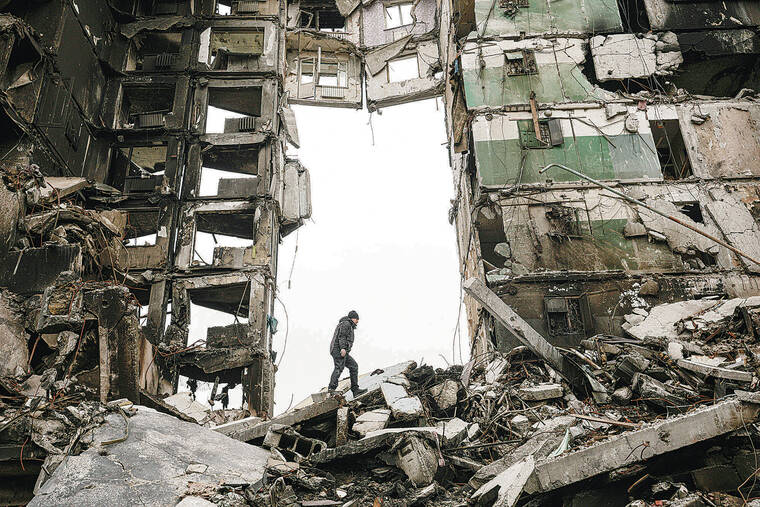The devastation wrought by Russia’s recent invasion of Ukraine has shaken our sense of humanity and set in motion inexorable changes to the global order. Few anticipated that the relief felt as we emerged from the grip of the COVID-19 omicron variant would be shattered so immediately and intensely.
The Russian shelling of not only military targets and infrastructure, but also of hospitals and schools, mines planted while in retreat and execution-style killings are deeply visceral. It is impossible to understand this aggression simply through the lens of geopolitics or even ruthless behavior to achieve a military objective. No, it would seem rather the acting-out of pent-up rage of one man, harbored since the fall of the Berlin Wall and the dissolution of the Soviet Union.
As fighting increases in the southern and eastern parts of Ukraine, more than 10 million citizens have been displaced. Already, over 4 million refugees have emerged amid allegations of war crimes and genocide.
The magnitude of this war on European soil, not seen since Hitler’s WWII blitzkrieg launch, has brought together the free world once more. The European Union’s squabbles with autocratic leaders of member states on its eastern flank, complaints of spendthrift economies on the southern flank and the travails of Brexit to the west now seem minor in comparison with the scale of Russian aggression.
Members of NATO have redoubled their commitments. Quite notably, Germany has awakened from its security slumber by increasing its defense budget and focusing on energy independence from Russia. Doubts about the American relationship with NATO arising from the last administration are settling.
Still, Ukraine, with a fraction of the military might of Russia, pleads for more support in the form of Soviet-era tanks and fighter jets already on hand in neighboring NATO countries. Ukrainian President Volodymyr Zelenskyy continues to press his case with the free world. If Ukraine loses this war, the aggressor will expand its efforts. If Ukraine prevails, it will be a lesson to the world that the alliance of liberal democracies is not in terminal decline and place would-be bad actors onto the back foot.
Despite tough talk and lack of wholesale support for Russian sanctions, China appears loath to risk damaging its trade with Europe, which is tenfold larger than its commerce with Russia. All of this comes at an inopportune moment for China, already struggling with an economic downturn, a property bubble and now a COVID-19 shutdown in Shanghai, as Xi Jinping tries to make his case this year for another term in office.
Economic impacts of the invasion include a rapid escalation in defense spending already driving an uptick in defense stocks. Prices for commodities, including wheat and soy, have also jumped as Ukraine, the breadbasket of Europe, remains under siege.
A return to normal food production in Ukraine will take years in any case. Shortages will be exacerbated by forces of climate change on agriculture throughout the globe. Energy prices, particularly for petroleum and natural gas, have also spiked, and the price is already felt at the pump.
Over the next few years, Europe will replace its supply of oil and gas from Russia with increased production from the U.S., but Russian oil will probably be not piped, but shipped to China and India. This will augment the transition to renewables and offer badly needed support to combat global warming.
Meanwhile, supply chain challenges, already troublesome as the result of posturing on tariffs and made worse by the pandemic, will deepen. The ripple effects of Ukraine include increased geopolitical uncertainty, which is driving nations toward reliance on domestic production and away from globalization.
Triggered largely by COVID-19 rescue funds, inflation in the U.S. has now risen above 7%, something not seen in decades. It is exacerbated on the supply side by reduced production and expanded sanctions plus increased demand as we emerge from pandemic restrictions.
The Federal Reserve Board anticipates several bumps in the interest rate over the next two years that will raise the base from near zero to 2% to 3%, but a soft landing may not be possible. Inflation is higher than it has been in decades, causing economists to argue that interest rate hikes will more likely lead to recession. In recent days we saw the classic warning sign: an inverted bond yield curve.
Labor shortages are among the strongest drivers of inflation. Last week we learned that in the U.S. there have never been as many available jobs. At the same time, amid the Great Resignation, more people than ever have decided not to engage in formal work. On the heels of low fertility rates and negative population growth, not only in the U.S. and Europe, but also Japan, China and India, changing demographics are also driving a shortage of willing workers.
Just like refugees of any nation whose homeland is subject to devastation and genocide, Ukrainians should be taken in by nations that can. It is the right thing to do for humanitarian reasons. As it happens, there is also plenty of work.
———
Dr. Ira Zunin is a practicing physician. He is medical director of Manakai o Malama Integrative Healthcare Group and Rehabilitation Center. Please submit your questions to info@manakaiomalama.com.

